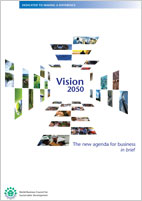Alcoa (NYSE:AA) and a diverse group representing 29 leading global companies across 14 industries today called on businesses around the world to develop strategies that would enable a global population of some 9 billion people to live well within the resources of the planet by 2050.

Alcoa and the World Business Council for Sustainable Development (WBCSD) are partnering to provide companies with a pathway to reach a sustainable global society by 2050. The Council today launched the joint report, Vision 2050: The New Agenda for Business, at the World CEO Forum in New Delhi. The report outlines vast new business opportunities – valued as much as US$6.2 trillion – for companies that have the foresight to lead with a sustainable development agenda.
Alcoa Executive Vice President and Chief Technology Officer Dr. Mohammad A. Zaidi co-chaired the extensive 18-month project.
“Vision 2050 lays out the challenges, pathway and options that business can use to create an opportunity-rich strategy, both regionally and globally, that will lead to a sustainable world,” said Dr. Zaidi.
“The world already has the knowledge, science, technologies, skills and financial resources needed to achieve Vision 2050. However, concerted global action in the next decade will be required to bring these capabilities and resources together, putting the world on the path to sustainability.”
The 80-page publication outlines a future in which the projected world population in 2050 – 9 billion people – could live well, enjoying good health, food, shelter, energy, mobility and education. In the Vision 2050 scenario, global society attains this standard of living at a sustainable rate, without additional harm to biodiversity, climate and the ecosystem.
Sustainability is a core value to Alcoa, which is a member of the Dow Jones Sustainability Index. Some of the most recent company accomplishments include:
Through 2009, the company achieved a 43% reduction in greenhouse gasses from the 1990 base year – a 72% improvement over our target for 2010.
Approximately 90% of Alcoa’s worldwide operations have community programs, putting the company within reach of its target of 100% by 2010.
Alcoa has been ranked by the Covalence Ethics Index 11 out of 581 companies in ethical reputation among all companies worldwide and first in the Resources category.
73 percent of all aluminum ever produced is still in use today helping to make it one of the most sustainable materials in the world. The light-weight material also lowers emissions in transport products.
“Partnering with WBCSD on the Vision 2050 project was natural for Alcoa, because sustainability is inherent to us as a company,” Dr. Zaidi said. “Aluminum in and of itself is one of the most sustainable materials in the world because it is infinitely recyclable. Seventy-three percent of all of the aluminum that has ever been made since 1888 is still in use today through recycling.”
Vision 2050 spells out the “must haves” – the things that must happen over the coming decade to make a sustainable planetary society possible. These include:
Meeting the development needs of billions of people, enabling education and economic empowerment, particularly of women, and developing radically more eco-efficient solutions, lifestyles and behavior
Incorporating the costs of externalities, starting with carbon, ecosystem services and water, into the structure of the marketplace
Doubling agricultural output without increasing the amount of land or water used
Halting deforestation and increasing yields from planted forests
Halving carbon emissions worldwide (based on 2005 levels) by 2050, with greenhouse gas emissions peaking around 2020 through a shift to low-carbon energy systems and highly improved demand-side energy efficiency
Providing universal access to low-carbon mobility
Delivering a four- to ten-fold improvement in the use of resources and materials.
As part of this transformation, Vision 2050 calls for business to work with government and society worldwide to transform markets and competition.
Vision 2050, with its best-case scenario for sustainability and pathways for reaching it, is intended not to be a definitive blueprint, but a tool for thought leadership, a platform for beginning the dialogue that must take place to navigate the challenging years to come.
“It is hoped that the Vision 2050 work will be used for many years to come,” said Per Sandberg, project director for Vision 2050. “It is designed to be a platform for companies when deliberating strategies and for dialogue with governments and society about how to realize the sustainable future.”